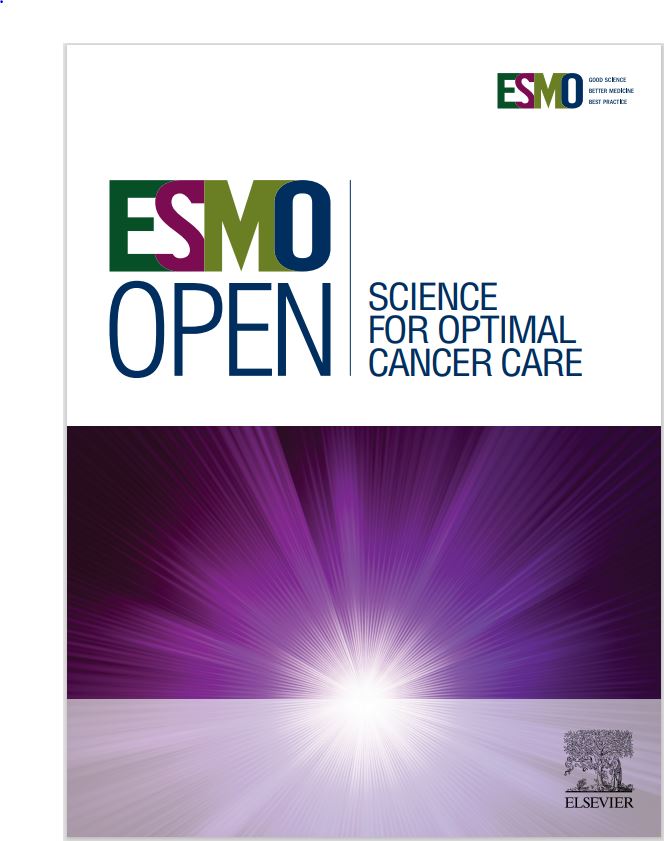The association of high body mass index with the safety and efficacy of sacituzumab govitecan in patients with metastatic triple-negative breast cancer from the ASCENT study
IF 7.1
2区 医学
Q1 ONCOLOGY
引用次数: 0
Abstract
Background
Sacituzumab govitecan (SG) is a trophoblast cell-surface antigen 2-directed antibody–drug conjugate (ADC) approved in multiple countries for relapsed/refractory metastatic triple-negative breast cancer (mTNBC) based on results from the phase III ASCENT study. The incidence of obesity has grown to epidemic proportions in recent decades; it is unclear what impact this has on treatment outcomes, especially for ADCs like SG that have weight-based dosing. We report the association of body mass index (BMI) with efficacy and safety of SG versus chemotherapy among patients with mTNBC from the ASCENT study.
Patients and methods
This ad hoc subgroup analysis included patients from the intent-to-treat population of ASCENT who received SG at 10 mg/kg of body weight or chemotherapy. BMI, assessed at baseline, was classified as normal (18.5 to <25 kg/m2), overweight (25 to <30 kg/m2), and obese (≥30 kg/m2).
Results
A total of 509 patients were included. Longer progression-free survival was observed with SG versus chemotherapy in patients from all BMI subgroups [normal: 4.2 versus 2.1 months, hazard ratio (HR) 0.48, 95% confidence interval (CI) 0.34-0.67, P < 0.0001; overweight: 4.6 versus 1.5 months, HR 0.31, 95% CI 0.20-0.47, P < 0.0001; obese: 5.9 versus 2.6 months, HR 0.34, 95% CI 0.21-0.53, P < 0.0001]. SG also led to improved overall survival and objective response rates versus chemotherapy in all evaluated BMI subgroups. With SG treatment, the incidence of treatment-emergent adverse events of grade ≥3, and those leading to dose reductions and study drug interruptions, was higher in patients with overweight and obese BMI compared with normal BMI; however, the rates of treatment discontinuation remained low and similar across the subgroups.
Conclusions
To our knowledge, this is the first study evaluating the association of BMI with outcomes with ADCs. SG demonstrated improved efficacy versus chemotherapy and a manageable safety profile in all evaluated BMI subgroups from ASCENT.
在ASCENT研究中转移性三阴性乳腺癌患者中,高体重指数与sacituzumab govitecan安全性和有效性的关系
sacituzumab govitecan (SG)是一种滋养细胞表面抗原2导向的抗体-药物偶联物(ADC),基于III期ASCENT研究的结果,已在多个国家批准用于治疗复发/难治性转移性三阴性乳腺癌(mTNBC)。近几十年来,肥胖的发病率已经上升到流行病的程度;目前尚不清楚这对治疗结果有什么影响,特别是对于像SG这样以体重为基础给药的adc。我们报告了ASCENT研究中mTNBC患者的体重指数(BMI)与SG与化疗的疗效和安全性的关联。患者和方法这个特别的亚组分析包括来自ASCENT的意向治疗人群的患者,他们接受了10mg /kg体重的SG或化疗。基线时评估的BMI分为正常(18.5 ~ 25kg /m2)、超重(25 ~ 30kg /m2)和肥胖(≥30kg /m2)。结果共纳入509例患者。在所有BMI亚组患者中,SG与化疗相比,观察到更长的无进展生存期[正常:4.2个月vs 2.1个月,风险比(HR) 0.48, 95%可信区间(CI) 0.34-0.67, P <;0.0001;超重:4.6 vs 1.5个月,HR 0.31, 95% CI 0.20-0.47, P <;0.0001;肥胖:5.9个月vs 2.6个月,HR 0.34, 95% CI 0.21-0.53, P <;0.0001]。与化疗相比,SG在所有评估的BMI亚组中也提高了总生存率和客观缓解率。在接受SG治疗时,超重和肥胖BMI患者治疗后出现的≥3级不良事件以及导致剂量减少和研究药物中断的不良事件的发生率高于正常BMI患者;然而,治疗中断率仍然很低,并且在亚组中相似。据我们所知,这是第一个评估BMI与adc预后之间关系的研究。在ASCENT评估的所有BMI亚组中,SG的疗效优于化疗,安全性可控。
本文章由计算机程序翻译,如有差异,请以英文原文为准。
求助全文
约1分钟内获得全文
求助全文
来源期刊

ESMO Open
Medicine-Oncology
CiteScore
11.70
自引率
2.70%
发文量
255
审稿时长
10 weeks
期刊介绍:
ESMO Open is the online-only, open access journal of the European Society for Medical Oncology (ESMO). It is a peer-reviewed publication dedicated to sharing high-quality medical research and educational materials from various fields of oncology. The journal specifically focuses on showcasing innovative clinical and translational cancer research.
ESMO Open aims to publish a wide range of research articles covering all aspects of oncology, including experimental studies, translational research, diagnostic advancements, and therapeutic approaches. The content of the journal includes original research articles, insightful reviews, thought-provoking editorials, and correspondence. Moreover, the journal warmly welcomes the submission of phase I trials and meta-analyses. It also showcases reviews from significant ESMO conferences and meetings, as well as publishes important position statements on behalf of ESMO.
Overall, ESMO Open offers a platform for scientists, clinicians, and researchers in the field of oncology to share their valuable insights and contribute to advancing the understanding and treatment of cancer. The journal serves as a source of up-to-date information and fosters collaboration within the oncology community.
 求助内容:
求助内容: 应助结果提醒方式:
应助结果提醒方式:


